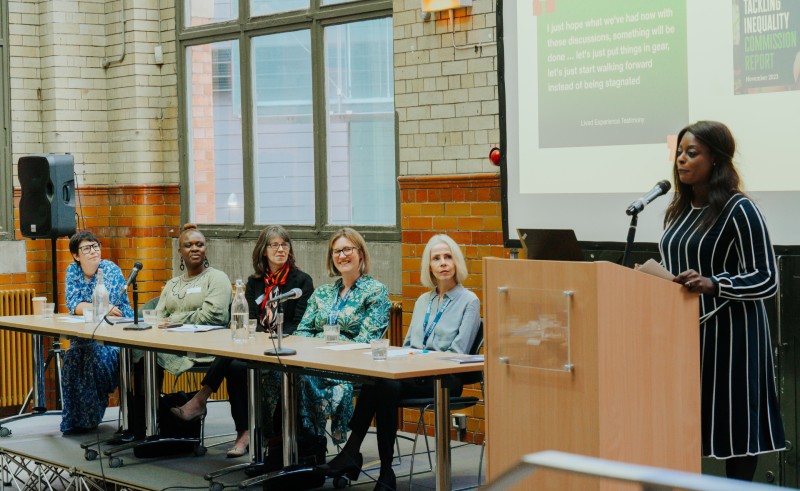
We know that diabetes does not affect everyone equally - the conditions you're born in, live in and work in, as well as your ethnicity, all contribute to your likelihood of developing type 2 diabetes as well as impact the care you receive for any type of diabetes.
In 2023, we launched the Tackling Inequality Commission to view the multiple factors that contribute to health inequality through the lens of those most at risk of inequality in diabetes, namely those experiencing poverty as well as Black and South Asian communities.
What is the Tackling Inequality Commission?
The Diabetes UK Tackling Inequality Commission was set up in January 2023. It is co-chaired by:
- Dr Faye Ruddock: Chair of the Caribbean & African Health Network, and Director of the health Equity and Social Justice Institute, University of Bolton
- Professor Linda Bauld: Bruce and John Usher Chair in Public Health in the Usher Institute, College of Medicine at the University of Edinburgh, and Chief Social Policy Adviser to the Scottish Government.
The Tackling Inequality Commission Report
We’ve been listening to the voices of people with diabetes who’ve experienced the impact of inequality on their health, and to the healthcare professionals and organisations working to ensure everyone has the same chance to fair care through focus groups and in-depth interviews.
We need healthcare professionals, policymakers and organisations to come together to play their respective parts in making these tangible and achievable changes happen without delay.
Our commission report sets out a series of recommendations depending on where you work, and whether you’re making changes as an individual, or at an organisational level, to deliver the change that’s needed. It draws out the significant challenges people living in deprivation are facing and acknowledges that racism is a public health issue that needs a bold and sustained cultural shift to eradicate.
This can’t be done without understanding the lenses through which our calls to action need to be considered, which is why we’ve laid out 4 key principles to consider when you put them into action.
You can download the full Tackling Inequality Commission Report (PDF, 11,580KB) here.
Or download the Tackling Inequality Commission Report, Executive Summary (PDF, 2,550KB).
What is Diabetes UK doing in 2024?
We know we've not always done enough to tackle inequality that is so prevalent in diabetes. Our 2020 strategy, A Generation to End the Harm, identified the need to address inequality if we are to have a world where diabetes can do no harm.
In 2021 we launched our Tackling Inequality Commitments to Action, in which we recognised the vital importance of partnership to drive our charity's work forward through a tackling inequality lens.
In 2023, learnings from our commission report and beyond demonstrated clearly that Diabetes UK has a role, both on our own and in partnership with others, in reducing inequality and in guarding against inadvertently widening inequality in what we do.
Read our full action plan to find out more (PDF, 1MB).

Colette Marshall, Chief Executive at Diabetes UK, said:
“We are honoured to launch our Tackling Inequality Commission report. Many people and communities have contributed to make it the powerful call-for-action that it is.
"Together we have created a series of practical, but ambitious, recommendations aimed at tackling inequality in diabetes care: for healthcare professionals, for services, for government, and crucially, for us as the largest diabetes charity in the UK.
“We’ve listened to people affected by inequality and now we’re determined to put those learnings into action, both in our own house and in partnership with others.”

Dr Faye Ruddock said:
“I am delighted that this report amplifies the voices of communities experiencing racial inequalities, along with those facing deprivation, which often go hand in hand.
"We must now work with communities and system leaders to ensure that the calls in this report are backed by action and accountability and lead to the change needed to address systemic and structural racism through our policies, practices, guidance and research.”

Professor Linda Bauld said:
“This report shows us how much where you live, work, grow and age affect your risk of diabetes and your ability to access the care and support you need.
"We need policy makers to listen to the people most affected and commit to the long-term changes needed to remove the unacceptable inequality we currently see in diabetes.”
Get involved
For further information about the Diabetes UK Tackling Inequality Commission, including requests for a presentation or discussion at a meeting, contact us at inequalitycommission@diabetes.org.uk.
If you are living with diabetes and would like to be involved in guiding our work through projects like this join our communities in action group where you will have regular opportunities to tell us your views. Find out more here.
This Tackling Inequality Commission Report has been developed by Diabetes UK and its designated co-chairs, kindly supported by sponsorship funding from Eli Lilly and Company, and Abbott. These sponsors have contributed evidence where appropriate through our open calls but have had no responsibility for developing or shaping the content of this work or the recommendations of the report.
